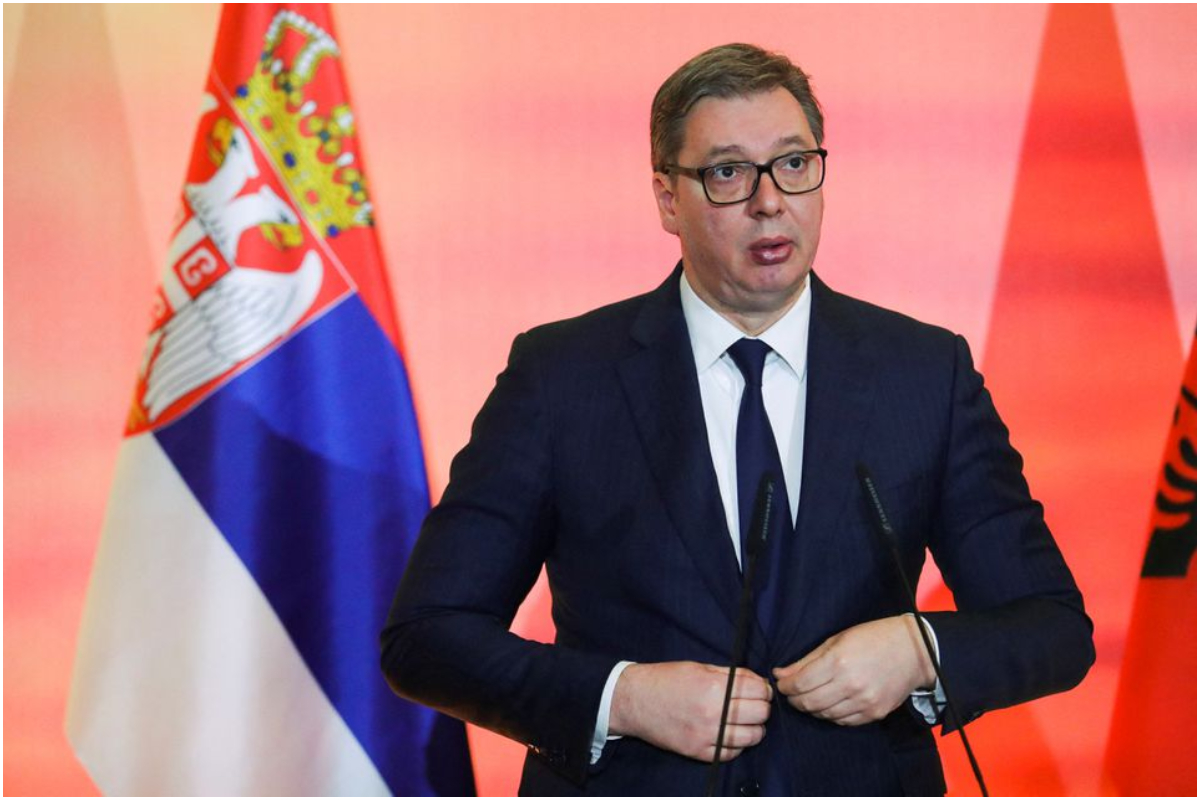- Serbia refuses to recognise Kosovo’s independence as a sovereign nation.
- On Saturday, a stun grenade was thrown at EU police in the majority-Serb region.
- After meeting with his national security council, Mr. Vui stated to Reuters that he wished to diffuse the situation.
As tensions between Kosovo’s government and ethnic Serbs escalate, Serbian President Aleksandar Vui has convened with his national security council.
On Saturday, a stun grenade was thrown at EU police in the majority-Serb region of northern Kosovo, and local police exchanged fire with unidentified parties.
After Kosovar police were dispatched to resolve a disagreement over licence plates, ethnic Serbs erected roadblocks.
Serbia refuses to recognise Kosovo’s independence as a sovereign nation.
Kosovo, which has an overwhelming ethnic Albanian population, declared independence from Serbia in 1998-1999 following a war.
All parties were urged by NATO, which has peacekeeping troops in Kosovo, to avoid provocations. The EU has issued a similar warning, asserting that it will not accept attacks against EU police or criminal acts.
Saturday’s arrest of a former Serbian police officer precipitated the most recent rioting.
After meeting with his national security council, Mr. Vui stated to Reuters that he wished to diffuse the situation.
Prime Minister of Kosovo Albin Kurti referred to the demonstrators as “criminal gangs” and requested that the NATO-led Kosovo Force (KFOR) demolish the barriers.
Saturday night, police in Kosovo reported being fired upon in many areas near a lake bordering Serbia, with cops firing back in self-defense.
End of last week, Kosovo dispatched police to majority-Serb districts, which do not recognise the Kosovo government in Pristina. This increased emotions, which had already been elevated for months due to a dispute over automobile licence plates.
Mr. Vui stated that the use of law enforcement breached prior peace agreements. He stated that he intended to approach NATO peacekeepers for permission to send Serbian police and troops to the region, but conceded that there was a slim possibility this would be granted.
KFOR peacekeepers play a critical role whenever tensions escalate between Kosovo and Serbia, or between Kosovo’s Serb minority and the authorities in Pristina.
They are not required to perform any specific actions. For the better part of two decades, the simple presence of the 4,000 multinational troops has been sufficient to prevent any severe problems.
The Belgrade government relies on KFOR to ensure the safety of Kosovo-Serbs. They fear a replay of the 2004 violence that resulted in the deaths of more than a dozen Serbs, the injury of hundreds more, and the displacement of tens of thousands of Serb families.
In addition, the presence of KFOR serves as a guarantee that Serbia will not send its own forces into Kosovo. Belgrade is cognizant of the fact that attacking NATO forces would be exceedingly unwise.
So, while emotions may continue to be elevated, events are likely to be rare. Nevertheless, the EU will work around the clock to bring both parties to the table in order to negotiate a long-term resolution.
In 2008, Kosovo declared independence, ten years after the horrific one-year war. Serbia does not recognise it as a sovereign state but accepts the governmental authority in accordance with a 2013 agreement to normalise relations.
92% of Kosovo’s 1,8 million inhabitants are Albanian, whereas only 6% are Serbian.
The police officer arrested on Saturday was one of approximately 600 ethnic Serbs who resigned from the force in November in protest after Kosovo officials announced they would ask Serbs to exchange pre-war Serbian licence plates for Kosovar ones.
Approximately 50,000 individuals in predominantly Serbian areas have refused to use Kosovo licence plates because they do not recognise Kosovo’s independence from Serbia.
A compromise brokered by the EU at the end of November resulted in an uneasy agreement between the two parties, with Kosovo abandoning plans to punish individuals who did not switch their licence plates and Serbia agreeing to cease issuing registrations with the initials of municipalities in Kosovo.
[embedpost slug=”kosovo-roads-blocked-by-serbian-protestors-and-police/”]





















